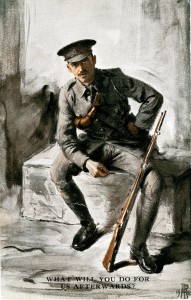What Will You Do For Us Afterwards?
Returned Soldier Writes of Ghosts
Too often the loser in that struggle was the ex-soldier, reduced to plead[ing] hopelessly with soul-less powers who renege their promises made, who grind these broken veterans to starvation, shame and suicide. (Will R. Bird M.M. (Returned Soldier) in Death So Noble, J. Vance, p. 119)
William Richard Bird was a soldier whose shared Great War experience with so many veterans became the impetus for his work as a writer. His brother, Stephen Bird, was killed by that war and William wished to take his place at the front. For two years William served with the 42nd Canadian Infantry Battalion (Royal Highlanders of Canada). From this time at the front and the emotional legacy left by his brother William penned two books And We Go On (1930) and Ghosts Have Warm Hands (1968).
Having decided in 1928 to become a fulltime writer his work appeared in the Toronto Star Weekly, Family Herald and the Saturday Evening Post. In 1931 MacLean’s Magazine sent William Bird back to France where his return to the conflict in the peace, became the series Thirteen Years After. The series further became a tour and a book. Yet for all of William’s efforts towards providing and sharing his experiences of this Great War, known to many veterans, war was not done with this former soldier.
William and his wife Ethel lost their only son Captain Stephen Stanley Bird (North Nova Scotia Highlanders) leading to William producing stories sharing his grief, and his connection to ghosts with warm hands.
What will you do for us afterwards the soldier asks?…I will write…I will read.
The Bird Family
Stephen Carman Bird was killed 8 October 1915, age 19 while serving with B Company of the 25th Canadian Infantry Battalion. Stephen is commemorated on the Ypres (Menin Gate) War Memorial. Previously reported missing it is believed that Stephen was killed by the explosion of an enemy mine.
Stephen Stanley Bird was killed 8 July 1944, age 24 while serving with the North Nova Scotia Highlanders. He is buried at Beny-sur-Mer Canadian War Cemetery, France.
William Richard Bird was awarded the Military Medal for Bravery in the Field. There is no citation for the award. William died 28 January 1984, age 92,
Ethel May Sutton Bird married William 18 June 1919 at Nappan, Cumberland, Nova Scotia. They had two children Stephen and Betty. Ethel died 25 July 1982, age 86.
Apart from Stephen and William Bird they had two more brothers. Lewis Bransby Bird and Hubert Craige Bird. Hubert served in the 193rd Canadian Infantry Battalion and was wounded 29 September 1918 in the left arm, left knee and head while serving with the 85th Battalion. By profession Hubert was a photographer prior to joining the army.


Comments